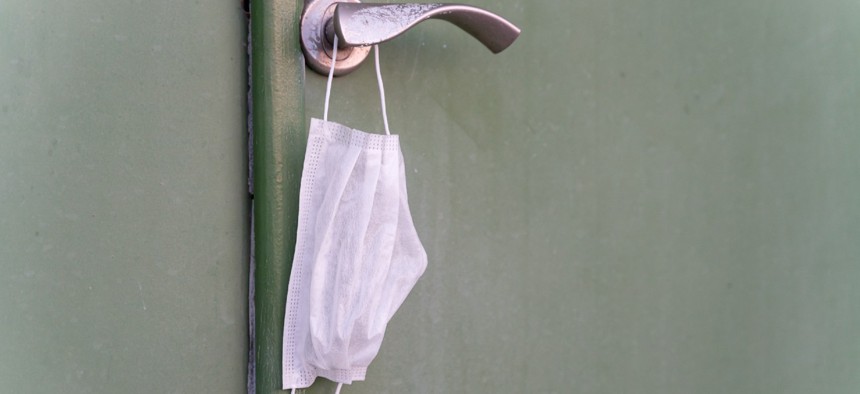
Tat'âna Maramygina / Getty Via EyeEm
Union Calls on OSHA to Restore COVID Safety Standards for Health Care Workers
The workplace safety agency announced last week that it was partially withdrawing its emergency temporary standard for health care workers because it legally can only be in place for six months.
The nation’s largest federal employee union urged the Occupational Safety and Health Administration to reconsider its decision to rescind part of its temporary COVID-19 workplace safety standards for health care workers, although the agency said that move was required by law.
Last week, OSHA announced that it was partially rescinding its emergency temporary standard for health care workers that it had implemented in response to the COVID-19 pandemic last June. At the root of the issue is that the law governing the agency only allows for emergency temporary standards to be in place for six months, and a permanent set of regulations governing workplace safety amid an outbreak of infectious disease is not yet ready to be implemented, the agency said.
“OSHA announces today that it intends to continue to work expeditiously to issue a final standard that will protect health care workers from COVID-19 hazards, and will do so as it also considers its broader infectious disease rulemaking,” the agency wrote. “However, given that OSHA anticipates a final rule cannot be completed in a timeframe approaching the one contemplated by the OSH Act, OSHA also announces today that it is withdrawing the non-recordkeeping portions of the health care [emergency temporary standard].”
The temporary health standard required health care providers to screen all patients for COVID-19; mandated that policies and procedures comply with Centers for Disease Control and Prevention guidelines; and required face masks and other personal protective equipment and social distancing, along with physical requirements like barriers at work stations and improvements to HVAC systems. It also required employers to provide paid leave for employees to get the COVID-19 vaccine, recover from any side effects as well as if they were exposed to or infected with the virus.
The recordkeeping requirements of the emergency temporary standard will remain in place.
But in a statement Tuesday, Everett Kelley, national president of the American Federation of Government Employees, whose union represents health care workers at the Veterans Affairs Department, called the rescission of the temporary standard a “terrible blow” to employees. He urged the agency to not only restore the emergency temporary standard, but to expand it to cover all frontline workers.
“The [temporary standard] not only protected workers by mandating that employers provide personal protective equipment, physical barriers, ventilation and require screening of each individual who enters the facility, it also provided paid leave to workers who must quarantine due to infections or exposure—which was critical to ensuring that workers stay home when they are sick,” he said. “While we applaud OSHA for working on a permanent infectious disease standard, something our union has long fought for, we know that finalizing such a standard will take years—which is time our front-line workers do not have as the Omicron variant continues to surge, resulting in thousands of new infections each day.”
A Labor Department spokesperson declined to answer questions regarding whether the agency is legally able to reissue the emergency temporary standard or when the agency plans to issue a permanent rule governing workplace safety during a pandemic, but stressed that several elements of the now expired standard will be enforced through employers’ “general duty” under the Occupational Safety and Health Act.
“As OSHA works toward a permanent regulatory solution, employers must continue to comply with their obligations under the general duty clause, the personal protective equipment and respiratory protection standards, as well as other applicable OSHA standards to protect their employees against the hazard of COVID-19 in the workplace,” the spokesperson said. “OSHA will vigorously enforce these ongoing requirements. In doing so, OSHA will accept compliance with the terms of the health care ETS as satisfying employers’ related obligations under the general duty clause, respiratory protection and [protective equipment] standards.”
NEXT STORY: GovExec Daily: Feds Fighting the COVID-19 Surge







